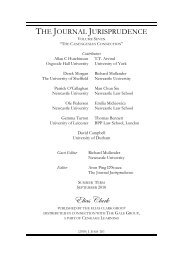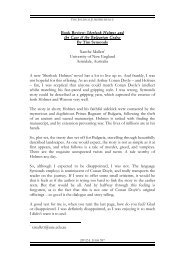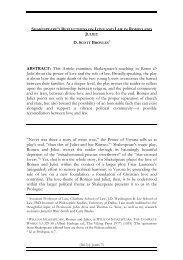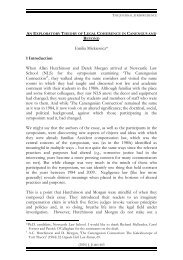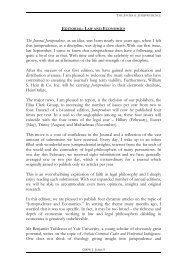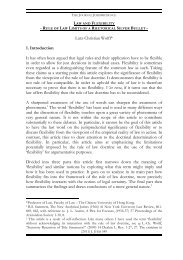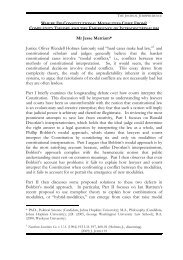On the Formation of the American Corporate State - The Journal ...
On the Formation of the American Corporate State - The Journal ...
On the Formation of the American Corporate State - The Journal ...
You also want an ePaper? Increase the reach of your titles
YUMPU automatically turns print PDFs into web optimized ePapers that Google loves.
SKOURAS ON THE FORMATION OF THE AMERICAN CORPORATE STATE:THE FULLER SUPREME COURT, 1888-1910accomplish this? It gave it a substantive economic interpretation. 15 It relied on<strong>the</strong> treatises <strong>of</strong> Cooley and Tiedeman 16 to help fortify <strong>the</strong> protection <strong>of</strong>property. Also, Justice Stephen Field 17 served as one <strong>of</strong> <strong>the</strong> key players on <strong>the</strong>Court defending property rights.<strong>The</strong> Reconstruction Amendments opened <strong>the</strong> door for <strong>the</strong> Court to use <strong>the</strong>Due Process Clause as a policy instrument for an emerging Industrial America.<strong>The</strong> Court redirected <strong>the</strong> Fourteenth Amendment from helping <strong>the</strong> formerslaves 18 to helping build <strong>the</strong> corporate state. 19 And, it became a given by <strong>the</strong>restrictions that apply to <strong>the</strong> federal government. <strong>The</strong> Due Process Clause traces its origin to<strong>the</strong> Magna Carta. For additional research on <strong>the</strong> Fourteenth Amendment, See, CHESTERANTIEAU, THE ORIGINAL UNDERSTANDING OF THE FOURTEENTH AMENDMENT (1981);MICHAEL K. CURTIS, NO STATE SHALL ABRIDGE: THE FOURTEENTH AMENDMENT AND THEBILL OF RIGHTS (1986); WILLIAM E. NELSON, THE FOURTEENTH AMENDMENT: FROMPOLITICAL PRINCIPLE TO JUDICIAL DOCTRINE (1988).14 MICHAEL KAMMEN, A MACHINE THAT WOULD GO OF ITSELF: THE CONSTITUTION INAMERICAN CULTURE 7 (1987); See generally, SANFORD LEVINSON, OUR UNDEMOCRATICCONSTITUTION: WHERE THE CONSTITUTION GOES WRONG (2006) (a broader critique on <strong>the</strong>undemocratic nature <strong>of</strong> <strong>the</strong> Constitution).15 WILLIAM M. WIECEK, LIBERTY UNDER LAW: THE SUPREME COURT IN AMERICAN LIFE 116(1988) (“Bradley’s dissent in Slaughterhouse was more far-reaching. In a brief passage, heconjured up <strong>the</strong> doctrine <strong>of</strong> substantive due process out <strong>of</strong> <strong>the</strong> natural rights tradition…<strong>the</strong>transformation <strong>of</strong> <strong>the</strong> concept <strong>of</strong> property from tangible objects (e.g., land, wagons, horses) tointangible rights and expectations, such as <strong>the</strong> abstract right to sell one’s labor or <strong>the</strong>expectation <strong>of</strong> pr<strong>of</strong>it. [P]rocedural due process enabled courts to oversee <strong>the</strong> rules by whichtrials were conducted. Substantive due process, on <strong>the</strong> o<strong>the</strong>r hand, protected property rightsfrom legislative impairment.”)16 JAMES W. ELY, THE CHIEF JUSTICESHIP OF MELVILLE W. FULLER 1888-1910, at 63-64(1995); See also, CHRISTOPHER G. TIEDEMAN, A TREATISE ON THE LIMITATIONS OF POLICEPOWER IN THE UNITED STATES CONSIDERED FROM BOTH A CIVIL AND CRIMINALSTANDPOINT (Union, N.J.: Law Exchange 2001) (1886); THOMAS M. COOLEY, TREATISE ONTHE CONSTITUTIONAL LIMITATIONS WHICH REST UPON THE LEGISLATIVE POWER OF THESTATES (Union, N.J.: Lawbook Exchange 1998) (1868); James W. Ely, Jr., Economic Due ProcessRevisited, 44 VAND. L. REV. 213 (1991); Louise A. Halper, Christopher G. Tiedeman, ‘Laissez-FaireConstitutionalism’ and <strong>the</strong> Dilemmas <strong>of</strong> Small-Scale Property in <strong>the</strong> Gilded Age, 51 OHIO ST. L. J. 1249(1990); See generally, GEORGE SKOURAS, TAKING LAW AND THE SUPREME COURT: JUDICIALOVERSIGHT OF THE STATE’S ACQUISITION, USE, AND CONTROL OF PRIVATE PROPERTY (1998)(on <strong>the</strong> history <strong>of</strong> <strong>the</strong> police power and regulatory takings law).17 CARL BRENT SWISHER, STEPHEN J. FIELD: CRAFTSMAN OF THE LAW (1930); Charles W.McCurdy, Justice Field and <strong>the</strong> Jurisprudence <strong>of</strong> Government-Business Relations: Some Parameters <strong>of</strong> Laissez-Faire Constitutionalism, 1863-1897, 61 JOURNAL OF AMERICAN HISTORY 970 (1975); HOWARDFURER, THE FULLER COURT 1888-1910 (1986). PAUL KENS, JUSTICE STEPHEN FIELD:SHAPING AMERICAN LIBERTY FROM THE GOLD RUSH TO THE GILDED AGE (1997).18 Civil Rights Cases, 109 U.S. 3 (1883) (Civil rights for blacks were ignored and economic rightsfor <strong>the</strong> emerging corporation were privileged); See also, Plessy v. Ferguson, 163 U.S. 537 (1896)(<strong>The</strong> Fourteenth Amendment does not prohibit private citizens from discriminating againstblacks, with regard to hotel, <strong>the</strong>ater, or railroad accommodations. <strong>The</strong> Court promulgated <strong>the</strong>(2011) J. JURIS 40



